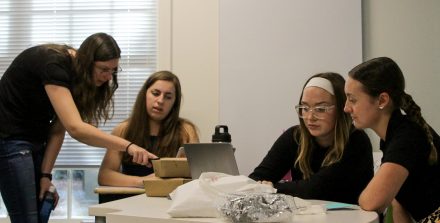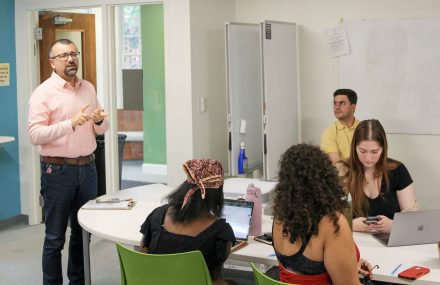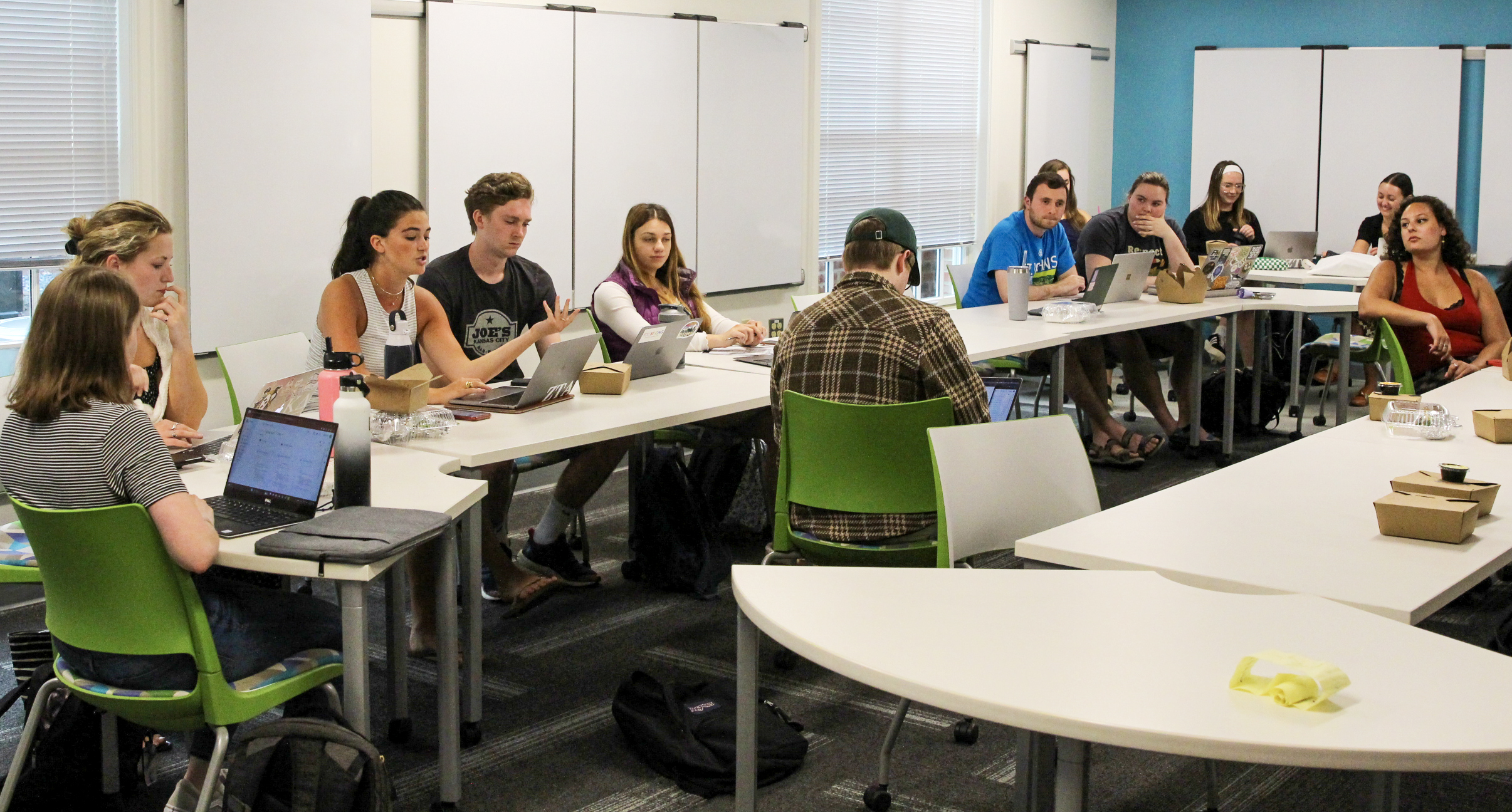Elon’s Department of Political Science and Policy Studies has hosted the Pi Sigma Alpha Undergraduate Journal of Politics since fall 2020. Students and faculty will continue editorial oversight of the national political science honor society’s journal for another three-year term through 2026.
Inside Gray Pavilion, a small but scrappy team of student editors and reviewers take turns at eating the elephant, three manuscripts at a time.
Submissions to the Pi Sigma Alpha Undergraduate Journal of Politics come from around the world and span such a breadth of topics as to be kaleidoscopic: immigration policy, climate change, healthcare, government spending, education, and on and on. Only the best of the best — about 3% — make the cut for the journal, which publishes in fall and spring.

“We publish four or five articles in each edition, and if there are exceptional ones, maybe six. So the success rate is very slim,” said Ashley Vann ’23, who with Lily Blake ’23 was a senior content editor for the journal in 2022-23.
Last spring, nearly 150 article manuscripts arrived. Vann and Blake whittled them down and the editorial board of about 15 Elon students reviewed (and re-reviewed) more than 100 of them, judging each for methodology, thoroughness and originality of approach.
Since Fall 2020, when Pi Sigma Alpha designated Elon University’s Department of Political Science and Policy Studies the journal’s host, Elon undergraduates have reviewed hundreds upon hundreds of research manuscripts by their peers around the globe, scouring them for the best and most promising angles of political science research.
“At the end of the day, we’re one of a handful of political science journals in the country that publish undergraduate work. In a way, we are defining the relevant literature in the future of political science, which I think is a powerful thing,” Blake said.
Earlier this year, Elon was tapped to host the journal for another three years, until 2026. Pi Sigma Alpha’s faculty editorial board is comprised leading scholars at 20 institutions, including Elon, in three countries.
Assistant Professor of Political Science and Policy Studies Aaron Sparks and Associate Professor of Political Science and Policy Studies Baris Kesgin are the journal’s faculty advisors and editors. The editorial board convenes in the POL 2710 Analyzing Political Inquiry course.

“This course is a non-traditional and multifaceted experience,” Kesgin said. “Students collaboratively manage a publication in its all steps. The journal experience exposes students to different research topics from higher education institutions across the United States and some from around the world.”
Working on the journal serves as a kind of mentoring incubator, with experienced students guiding those newly enrolled in analyzing article submissions. At least one upper class student sits in each review team of three to five students, sharing insights from past experience.
Those review teams are also a place where students bring their own skills and knowledge into practice. The journal course is open to students from all majors, which incorporates multiple disciplines into the review process.
“The input of students who aren’t political science or policy studies majors has been indispensable,” Kesgin said. “Their reading of political science research papers raises questions that may not occur to others, which significantly improves our evaluation of these papers. The papers we eventually publish are better manuscripts because of such feedback in the review process. These students also improve their analytical reading and thinking skills and ability to work effectively and constructively with others. Reading scholarship from a different academic discipline also broadens their horizons.”
Emma Bach ’24, a policy studies and public health studies double major, described working on a review team with a chemistry major her sophomore year, when she enrolled in the course out of curiosity.
“She had a good, different view on what we read. She was better at statistical analysis, whereas I felt stronger in the broader applications of policy,” Bach said. “Having the opportunity to hear from everyone across campus and being able to read and digest this information together is very valuable.”
Along with Nina Dascoli ’24, Bach was a junior content editor last year and will be a senior editor in 2023-24.
“Being senior content editor will be a big step up, but I think Nina and I can handle it. The opportunity to be a junior content editor and watch Ashley and Lily the whole year has helped a lot. We’ve served as point people for various tasks and checked in with senior content editors, Dr. Sparks and Dr. Kesgin, to help wherever they needed us to,” Bach said.
Sparks said that working on the journal offers a steep learning curve in a rigorous, supportive setting.
“Many students are a little apprehensive to join the class because they don’t feel like subject matter experts,” Sparks said, “but regardless of major, they learn quickly by reading the manuscripts and discussing with their peers who have been involved longer. There is a real sense of collaborative learning, and many students are proud of the voice they find in discussing and critiquing scholarship.”
Vann, who graduated in May with degrees in statistics, political science and data analytics, said that being exposed to volumes of research advanced her professional research skills and made her a better critical thinker and writer. It also gave her
Blake echoed those outcomes and said she found belonging and a sense of innovation working on the journal since her first year. In May, she graduated with degrees in political science and Spanish.
“There is a sense of community around a common mission of progressing innovative and original ideas in the world of research,” Blake said. “I think research sometimes gets a bad reputation for being boring, but the passion in this room when it comes to reading these original, creative and interdisciplinary papers from students around the country and all around the world has inspired me to do great things in my classes and care more about causes that I wouldn’t have known existed.”



